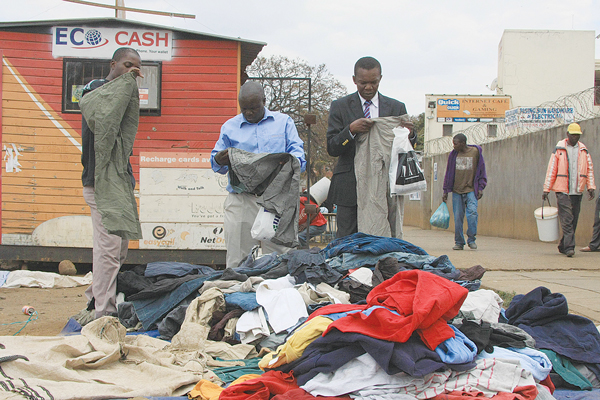
The sale of used clothes, including undergarments, is still a thriving business across Zimbabwe, despite government moves to ban their importation.
By Phyllis Mbanje
Tonnes of second-hand clothes continue to flood Zimbabwe, despite the health concerns and other issues that have been raised by Parliament as well as members of the public.
The current legislation does not deal with the issue of proving that imported clothes would be second-hand.
“The challenge we are facing is that once the used clothes are smuggled in, we cannot then arrest people selling the clothes since we cannot prove that when the items were brought into the country they were second-hand,” national police spokesperson Senior Assistant Commissioner Charity Charamba said.
When he was Finance minister in 2012, Tendai Biti said the importation and selling of second-hand clothing was demeaning.
“If you are a husband and see your wife buying underwear from the flea market, you will have failed,” Biti said at the time.
His sentiments sparked national debate, with many people condemning the practice on various fora.
- Chamisa under fire over US$120K donation
- Mavhunga puts DeMbare into Chibuku quarterfinals
- Pension funds bet on Cabora Bassa oilfields
- Councils defy govt fire tender directive
Keep Reading
The issue was addressed by Biti’s successor, Patrick Chinamasa, who last year indicated in his budget statement that the importation and sale of second-hand clothing would be banned.
He cited various reasons, including health implications.
However, four years after Biti’s complaints, the trade in second-hand clothing still thrives and the biggest market for the items — Mupedzanhamo flea market in Mbare — remains a hive of activity.
Matabeleland South proportional representation MP Priscilla Misihairambwi-Mushonga (MDC) last year caused a stir in the National Assembly when she waved used underwear in a desperate effort to cajole MPs into pushing for a ban on the trade in used clothes, especially undergarments.
A recent tour of Harare’s flea markets revealed that all sorts of used clothes were on the market and selling at very low prices.
A romper for a newborn costs only a dollar, while a vest or pair of shorts can be sold for just a few cents.
“These are quality clothes and I would rather buy from the flea market than buy new clothes, some of which are of poor quality,” a customer sifting through a pile of clothes heaped on the ground said.
Eager hands grab for the wide array of baby clothes, some of which are badly discoloured and torn.

No one appears to mind the stains, which authorities point at as the source of diseases.
Zimbabwe Association of Doctors for Human Rights chairperson and fellow of the Geneva Foundation of Medical Education and Research, Rutendo Bonde, said the economic situation was driving people to settle for cheaper goods.
“It is a question of value for money for this group and despite the health challenges, they are willing to buy second-hand underwear,” she said.
However, Bonde warned that such clothing could fuel diseases and infections, which are passed on contact.
“If one has a fungal infection from these clothes, when they bath, they leave the fungal spoor on the floor of communal bathrooms and the infection spreads that way,” she said.
According to resource material compiled by the Environmental Health Services branch, which is part of Health Department in Malaysia, second-hand goods do carry a few health risks such as infestations from scabies, mice, lice and fungi.
Transmission of lice, for instance, can occur through second-hand clothing and while many of these germs may survive only for a few days away from human contact, ringworms can remain contagious for much longer periods.
Underwear is more likely to carry germs as they contain microbes from traces of faeces and from genital infections, such as thrush.
Most of the wares are stained with unknown substances, which the vendors dismiss as one thing or the other.
Just as much as it is a health hazard, it has also become a moral concern.
“It is just not right for anyone to use underwear that has been used and discarded by another person. You would rather mend your old ones or go without,” talk show host Rebecca Chisamba, of the Mai Chisamba Show, said as she condemned the practice as humiliating and unhygienic.
“Even when we are distributing property of the deceased, we do not include underwear. It is burnt or discarded.”










